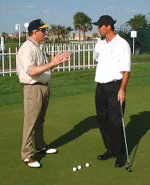
How to Get Into a Golf Rhythm
“How can I stop thinking so much when I play golf? I just can’t seem to find my rhythm on the course!”
Trying to find your rhythm early during a round of golf is a common issue with many golfers.
Distracting thoughts and overthinking often prevent golfers from “finding their flow.”
With all the breaks in action, you are left alone with your thoughts the majority of the time during a round of golf.
There are three major blocks of time when your thoughts may interfere with your rhythm:
1. Before the start of a round – Even before you take your first swing, you may be thinking, “My back is tight,” “I played horribly the last time I was on this course,” “I feel a little off today,” or, “I have trouble reading the greens here.”
These thoughts make it difficult to feel comfortable and get into your groove.
2. Before each shot – Prior to each shot, your head may be filled with distractions such as, “I’ve been putting so much work into my putting technique but I can’t seem to put it together,” “I need to birdie this hole to get back into the game,” “I can’t believe my rival is so far ahead of me,” or, “Why even try? I will never be able to hit this shot.”
Overthinking your shots, over analyzing technique or worrying about your score move you from “playing golf intuitively” to “thinking about playing golf”.
3. After each shot – Post-shot reactions are rhythm destroyers: “There I go again. Another bogey,” “What is wrong with me. I have totally lost control of where the ball is going,” “Might as well give up. Today is a lost cause,” or, “I need to make up four shots over the next six holes.”
These emotion-laden thoughts are sure-fire ways to prevent you from getting into a rhythm.
Thinking too much interferes with your rhythm: It can prevent you from both getting into the flow of your game and staying in a rhythm throughout a round.
Tiger Woods is a great example of how rhythm affects your game…
Throughout the past few years, Woods’ troubles with injuries, bad rounds, changing swing coaches, missing cuts and re-working technique have been well-documented.
All those thought distractions have affected Woods’ rhythm in tournaments. However, this year has been a different story for Woods…
Woods has steadily climbed the rankings, starting the 2018 season ranked 539th and breaking into the top-100 in just five months.
After his 12th place finish at the 2018 Honda Classic, Woods credited having fun and getting into an early rhythm as the keys to his success.
WOODS: “I feel like each time out I’ve gotten better, and I’ve gotten more of a feel for playing tournament golf. The last couple days, it felt easy to play tournament golf. The warm up felt good. I get into the flow of the round. I could find the rhythm of the rounds faster. The more golf I’m playing tournament-wise, the faster I’m able to click into the feel of the round.”
Getting into a rhythm is a matter of immersing yourself in the moment.
Of course, thinking is a part of the game.
You need to be able to strategize and make small adjustments, but you also must be able to maintain an even keel, trust your game and immerse yourself in each shot.
Getting into a rhythm will enhance your game, improve your consistency and make your overall experience in golf more enjoyable.
Find Your Flow in Golf:
The key is grounding yourself in the moment.
There are a few proven methods that help ground yourself:
- At the very end of your shot, when the ball comes to a complete stop, take a few deep breaths as a way to release the last shot and maintain a sense of calm.
- As you walk to your next shot, relax, hum a song, or talk with your playing partners to have more fun on the course.
- A pre-shot routine will help you clear the mental clutter and ready yourself for the shot ahead of you. Define what you want to focus on within your preshot routine.
Related Golf Psychology Articles
- How to Overcome Overthinking on the Golf Course
- Helping Golfers to Counter Overthinking
- How to Stop Overthinking During Your Swing
- Subscribe to The Golf Psychology Podcast on iTunes
- Subscribe to The Golf Psychology Podcast on Spotify
Golf Mental Coaching Programs

All golf psychology programs include the Golfer’s Mental Aptitude Assessment (GMAP), a custom Mental Game Plan, weekly coaching sessions, unlimited email correspondence, and The Golfer’s Mental Edge 2.0 workbook program.
One-on-one mental coaching is the fastest and most effective method to improve your mental game, boost your performance, and make lasting changes!
We have unique mental coaching programs, customized for you. Please contact us with any questions your have about our programs. Provide your name, email, and role below:
Or Call us today at 888-742-7225 | Mental Game Success Stories